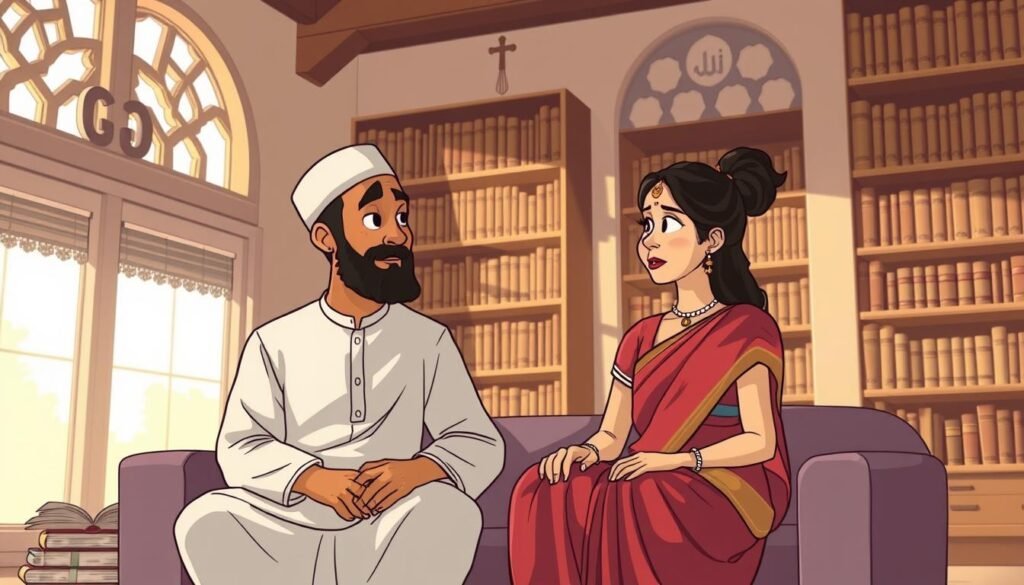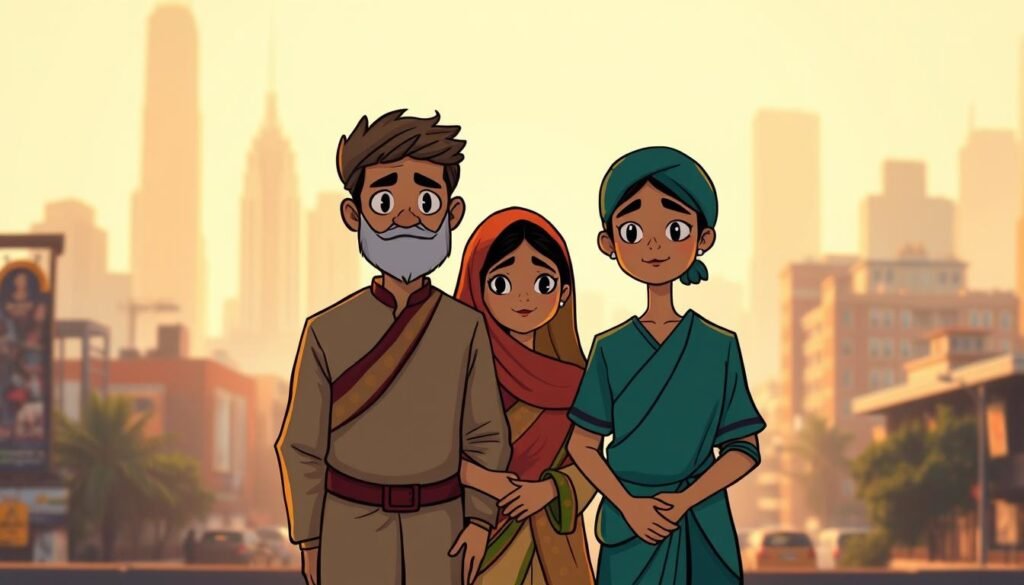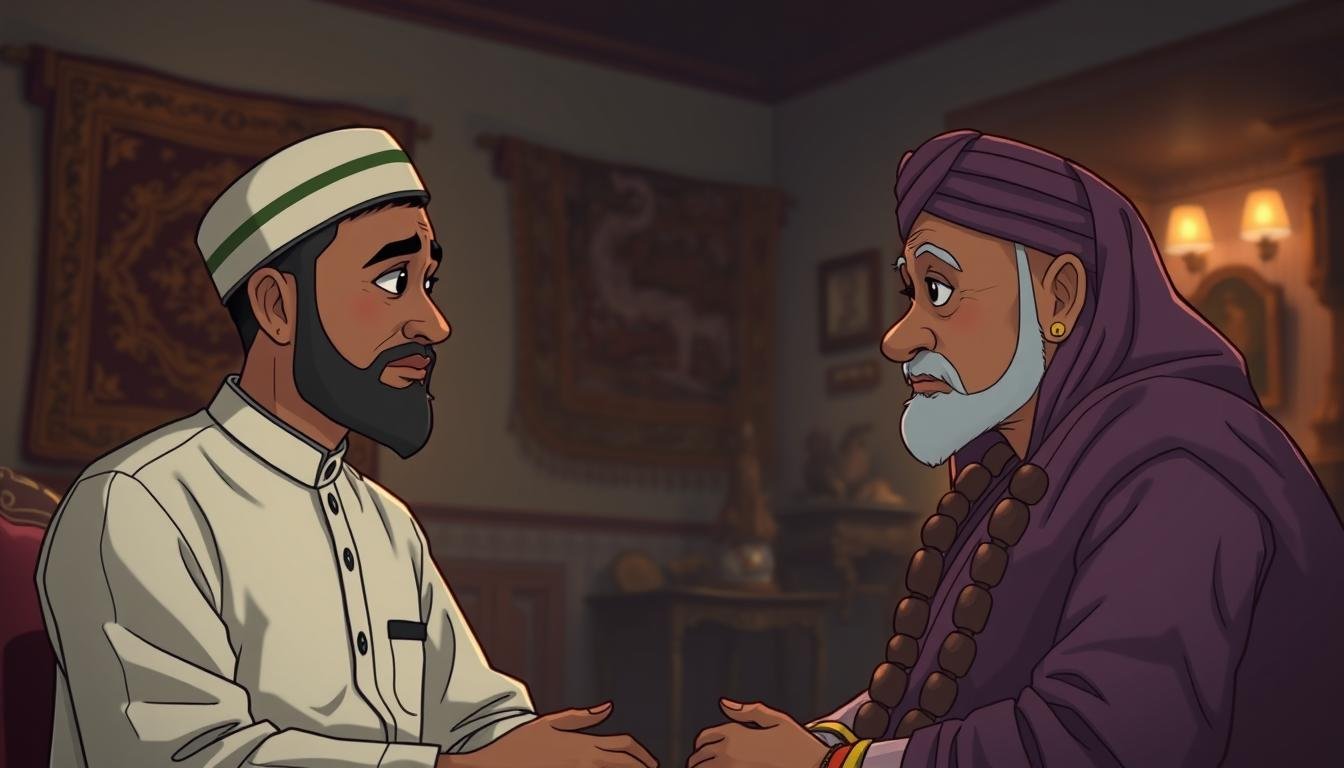Have you ever thought about love crossing religious lines? The topic of interfaith relationships touches hearts and traditions. For many, the dream of a Muslim Hindu marriage meets centuries of religious rules.
I’ve studied these dynamics and seen families torn. How do we balance faith with love? This article looks at Islamic and Hindu views on these unions, without judgment.
Sharia law says a Muslim man can marry a Hindu only if she converts. But, cultural realities make these rules hard to follow. What choices are there when hearts and beliefs clash?
These questions are very important. Families face legal uncertainty. They wonder if a Hindu ceremony is valid under Islamic law, or if a civil marriage can bridge the gap. The stakes are high, touching on personal, spiritual, and communal levels.
Understanding Marriage in Islam and Hinduism
Marriage is key in both Islam and Hinduism, but they have big differences. Islamic laws make marriage a contract, while Hindu rituals join couples. These show different views on life and faith.
Marriage in Islamic Tradition
In Islam, marriage is a contract callednikah. It sets out what each partner must do. Men can marry Jewish or Christian women, but not Hindus. The Quran says no to marrying idol-worshippers.
Women must marry Muslim men. Themahr helps make things fair, but faith can be a big problem.
Marriage in Hindu Dharma
Hindu laws say both partners must be Hindu to get married. Ceremonies likesaptapadi make the bond strong. But, getting married outside Hinduism is tricky.
Core Differences in Matrimonial Perspectives
Islam and Hinduism see marriage differently. Islam looks at faith first, while Hinduism values community. These views make it hard for couples to follow both.
“A believing slave woman is better than an idolatress, even if she is free.”
This verse shows Islam’s focus on faith. It’s different from Hinduism’s emphasis on community. These views mix in today’s relationships.
Traditional Religious Positions on Interfaith Marriage
Islamic tradition has strict rules on marriage. Scholars point to Quranic verses like 2:221 and 5:5. These verses allow Muslim men to marry Jewish or Christian women but not Muslim women to non-Muslims.
This rule is about keeping family faith and identity. In many Muslim countries, these rules are law. For example, Malaysia makes non-Muslims convert to marry a Muslim. Tunisia and Turkey have laws that make exceptions.
Hinduism also has rules against interfaith marriage. The Hindu Marriage Act only allows unions within Hindu, Sikh, Jain, or Buddhist traditions. New Indian laws, like waiting periods, show debates over keeping traditions alive.
Pew Research found 97% of Jewish people in Israel don’t want their child to marry a Muslim. This shows big societal doubts.
In the U.S., 10% of Muslim women marry outside their faith. This challenges old norms. Shariah’s rules and Hindu varna systems were made a long time ago. How do these old ideas fit with today’s values of choice and equality?
Can a Muslim Marry a Hindu According to Islamic Scholarship?
Islamic scholars have debated interfaith marriage for a long time. They say Hindus are mushrikun (polytheists), so Muslims can’t marry them. The Quran says believers can’t marry idolaters unless they change their faith.
For years, this rule has guided decisions. Muslim men could marry Jews or Christians (Ahl al-Kitab), but Hindus were not included.

Now, scholars face new challenges. Some think Hinduism might be seen as a “People of the Book” exception. But this idea is not widely accepted.
Others focus on personal choice and respect. They say “religious conversion for marriage should be about true faith, not just to please others. They wonder if conversion is always needed or if talking can help.
Traditionally, non-Muslim spouses had to convert to Islam. For women, this rule is strict. But in North America, some imams now allow civil partnerships, even if they’re not religiously approved.
Today’s scholars try to balance old rules with kindness. They encourage couples to learn and get support from their community.
Hindu Perspectives on Marrying Outside the Faith
In exploring Hindu marriage laws, we see a tradition based on rituals like the samskara. This sacred rite binds partners through shared dharma. Traditional teachings stress the importance of matching religious duties, seeing interfaith marriage as a disruption.
But modern times are changing these views. How do new beliefs update these old frameworks?
Classical Hindu texts rarely talk about interfaith unions. But the Hindu Marriage Act of 1955 limits its rules to Hindu couples. This shows traditional norms, but real-life shows a different story.
Take the 2012 wedding of Mustafa Plumber and Prachi Pinglay. Their ceremony included both families, showing a move toward inclusivity. Today, 38% of American Hindus marry outside Dharmic faiths, showing a shift in society.
“Our children celebrate Diwali and Eid equally,” says the Sawhney family. They blend rituals into a shared identity. Such stories show how interfaith marriage challenges laws but creates new cultural blends.
Yet, tensions remain. The case of Vidya and Shoaib’s 1996 elopement shows societal pressures are real. Even so, 50% of interfaith couples say they have supportive environments.
Modern Hindu thinkers say core principles like ahimsa (non-violence) and tolerance can work with interfaith marriage. But legal frameworks like the 1955 Act make formal recognition hard. Dilip Amin’s counseling shows over 1,200 South Asians deal with these issues every year.
How do laws keep up with changing spiritual views? The answer is in finding a balance between tradition and humanity’s need for connection.
Legal Frameworks Across Different Countries
Interfaith marriage laws vary worldwide, influenced by religion and secular rules. In India, the Special Marriage Act, 1954, is key. It allows marriages between different faiths. But, it has a 30-day notice rule, and its use is not even.
There were 272 communal incidents in 2022. This shows how legal rights and social norms sometimes clash.
In 29 countries, religious laws block interfaith marriages. In India, Hindus and Muslims face these rules every day. The Special Marriage Act tries to help but faces delays and local opposition.
It’s important to think about how laws keep peace and protect individual rights. How do we find a balance?
In places like Chhattisgarh, breaking anticonversion laws can lead to penalties. In Malaysia, sharia courts can fine or cane those who leave their faith. This shows a big challenge in balancing laws and religious rules.
There are 93 countries where child marriages are allowed. This highlights the need for better laws to protect the vulnerable.
How can we make laws work for everyone without losing cultural identity? The Special Marriage Act’s procedural hurdles show we need to talk more about fairness in diverse societies.
Cultural Challenges Beyond Religious Considerations
Interfaith marriage challenges go beyond just religious debates. They shape the daily lives of Muslim-Hindu couples. Families often face pressure to follow cultural norms.
My own conversations with interfaith couples show tensions over meal choices and holiday celebrations. In India, 67% of Hindus want to block intermarriages, fearing cultural loss. 80% of Muslims also share these concerns.
These numbers show a society where love stories like Nida Rehman and Mohan Lal’s are seen as threats to tradition. 
Many Muslim parents with adult children considering marrying outside their faith fear their grandchildren won’t practice any religion.
Family resistance can turn into legal threats. Conversion laws in places like Gujarat penalize forced conversions for marriage. Yet, unspoken pressures remain.
Imagine trying to decide on Eid and Diwali traditions together. Or whether to raise children with both faiths’ rituals. Surveys show 36% of Hindus would reject Muslim neighbors, yet 53% believe in diversity’s benefits.
For children, identity becomes a mix of both faiths. 40% of Muslim parents in the north worry about societal exclusion affecting their kids’ futures.
But these struggles aren’t impossible to overcome. Some families blend customs—fasting during Ramadan and celebrating Holi together. This shows cultural bridges can be built.
As seen in Nida’s case documented here, legal battles show deeper societal changes. By embracing dialogue and shared values, communities can turn challenges into chances for understanding.
The Special Marriage Act and Civil Unions
TheSpecial Marriage Act(SMA) of 1954 is India’s keyinterfaith marriage legal framework. It lets couples marry across faiths without changing their religion. But, it shows the struggle between legal rights and social norms.
The Act needs a 30-day public notice. This makes things clear but also puts couples at risk. Groups track these notices to attack interfaith couples.
“The Special Marriage Act of 1954 in India provides a secular framework for civil marriages, allowing individuals of any religion, including interfaith couples, to marry without the constraints of personal laws.”
Even with good intentions, there are problems. Over 4,000 couples have used the SMA through NGOs like Dhanak of Humanity. But, only 2.1% of marriages in India are interfaith.
Public notices are a big risk. Online posts have led to violence, like when Hindu-Muslim couples faced “Love Jihad” campaigns. Courts like Kerala’s have said notice publication is wrong, but it’s not enforced well.
The Act’s future depends on finding a balance. People want shorter notice times and online safety. As society changes, laws need to too. They should protect rights and keep people safe.
Will changes help those who are different, or will old ways win? This is what’s at stake for interfaith couples.
Successful Muslim-Hindu Couples: Real-Life Stories
Stories of Muslim-Hindu couples show the ups and downs of their relationships. Wasim and Deottima, an Indian couple, used the Special Marriage Act to get married. Their long-lasting love shows how laws can help love win over tradition.
Bollywood stars like Aamir Khan and Kiran Rao also made a big impact. Kiran, a Brahmin Hindu, married the Muslim Khan in 2005. Their son Azad, born through surrogacy, brings hope to those who doubt.
A 50-year interfaith marriage requires more than love—it needs dialogue. My husband and I learned Arabic and Sanskrit scriptures together, finding common ground in shared values of compassion.
Even when tensions rise, couples like Tejveer and Saira show that love can conquer all. They got married in three different ways, showing harmony is possible. Yet, 65% of Indians don’t approve of interfaith marriages, but 1% of couples prove it can work.
Hrithik Roshan and Sussanne Khan’s 14-year marriage, though ended, shows that love can last. They stayed committed to each other, even when society didn’t approve. Their story teaches us the importance of talking and understanding each other’s beliefs.
Despite 23 Indian states making religious conversion illegal, couples like Urmila Matondkar and Mir Mohsin Akhtar show strength. Their marriage, despite age and faith differences, shows that love can adapt. They say, “We never erased our identities,” and instead, “We built bridges.” Their stories, filled with patience and learning, inspire others in Muslim-Hindu relationships. Love, with curiosity, can overcome any obstacle.
Practical Considerations for Interfaith Couples
Interfaith marriage comes with legal and religious challenges. In the U.S., 45% of American Muslims marry outside their faith. This shows cultural and religious barriers are real.
A Hindu-Muslim couple must deal with Quranic rules. These rules say Muslim women can’t marry non-Muslims. They also talk about the need for conversion in some Islamic views.
India’s Special Marriage Act helps, but it’s hard to use. It’s full of red tape.
Talking openly about religious upbringing is key. Kids of interfaith couples often struggle with their identity. This happens when parents disagree on how to raise them.
Parents face social pressure too. Old conflicts between Islamic and Dharmic traditions in South Asia affect families. Conversion is a big issue. Muslim men can marry Hindu women if she converts. But Muslim women marrying Hindus is not accepted in places like Afghanistan or Algeria.
Getting legal advice is a must. In strict countries, marriage can be risky. Couples might need to make agreements about property or education.
Online groups like the Islamic Society of North America help. But, not everyone can access these resources.
Success in interfaith marriage needs respect and patience. While 29 countries ban it, open societies face their own challenges. Education, legal help, and community support are key. They help couples respect each other’s beliefs and traditions.
FAQ
Can a Muslim and a Hindu marry legally?
What are the main challenges faced by Muslim-Hindu couples?
What are Islamic views on marriages with Hindus?
How does Hinduism view interfaith marriages?
What are the fundamental differences in marriage traditions between Muslims and Hindus?
What is the role of family in Muslim-Hindu marriages?
How do interfaith couples navigate cultural differences?
What legal protections are in place for interfaith couples?
How do children of interfaith couples handle religious identity?
Are there documented success stories of Muslim-Hindu couples?

Embracing Faith, One Insight at a Time!
The teachings of the Quran have always guided my path. With a deep passion for Islamic knowledge, I strive to blend the wisdom of tradition with the relevance of today, making the timeless messages of Islam accessible and meaningful for everyone.
Muslim Culture Hub is my platform to share historical insights and thought-provoking articles, exploring both well-known and lesser-discussed aspects of Islamic culture and beliefs. My mission is to create an inclusive online space where everyone can learn, strengthen their faith, and connect with the profound message of Islam.
Join the journey!
May peace be upon you.








